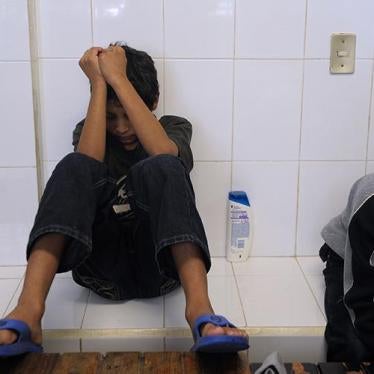Take a short drive through the overcrowded suburbs of Harare, Zimbabwe's capital, and you see long lines at public water holes and women with toddlers at shallow, unprotected wells. In some neighborhoods it's better to keep the windows up –the smell of raw sewage can be overwhelming.
You might not see residents stepping from their homes to find a place to squat and defecate, because even under such conditions, people try to protect their dignity and privacy. But get out of the car and ask around, and you'll hear about it pretty soon.
Last month the Harare city government announced on its website that the city was experiencing a major water shortage. The reality is Harare has a huge crisis on its hands.
The water shortage in Harare is not a new phenomenon, and over the years it has had devastating health consequences. In 2008-2009, cholera swept the country, killing more than 4,000 people and bringing disease to over 100,000 more. Today, diarrhoea is responsible for 10% of deaths of children under age 10.
Since the government is aware of the dangers from lack of access to potable water and sanitation, you would hope it was doing everything it could to ensure that everyone has access to sufficient clean water.
But the city government seems to have other things on its water agenda.
Just last week, a new posting on the government website announced that any home behind in paying its municipal water billswill be disconnected.
Water disconnections are common in Harare. When I researched access to water and sanitation there in 2012 and 2013, many families told me that they could not afford to pay their water bill, and as a result, huge debts have accrued.
Families showed me water bills of over US$1,000. Some parents said they are so afraid of having their water disconnected that they have paid their water bills with the money intended for their children's school fees.
Disconnecting people's water supply in the midst of a major water crisis is not only shortsighted and dangerous; it also violates Zimbabwe's obligations under international law to ensure everyone's right to a minimum amount of water. A failure to pay a water bill cannot deprive a person of this right.
Providing a minimum amount of water to everyone is no easy task, and Zimbabwe's water and sanitation problems are complex. Harare's network of pipes is old and crumbling, and requires a significant overhaul. The water treatment plants don't operate at full capacity and need real investment to serve the city adequately. Water treatment chemicals are expensive, and the city government is hard-pressed to pay for them.
It was recently revealed, however, that the vast majority of the city government's operating budget is spent on salaries and perks, flouting the Zimbabwe law that requires 70% of the budget to be used to improve service delivery infrastructure.
There are steps that the government needs to take to alleviate the suffering of its residents. The Harare city government should use a sliding water fee for lower-income families, and should immediately stop disconnecting the water supply for lack of payment. The government should commit to real transparency and accountability, and invite an independent monitor to ensure compliance with its own laws.
And on World Water Day, on March 22, the government of Zimbabwe should commit to upholding and prioritising its citizens' right to water and sanitation. The government made a step forward in 2013 when it enshrined the right to water in its new constitution. But without laws and policies that are actively implemented and enforced, this right will mean nothing but empty promises for the Zimbabwean people.








